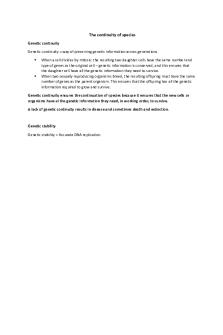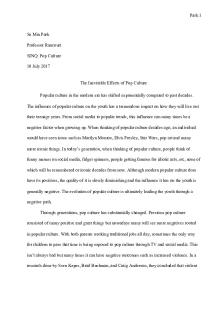The effects of the sensationalism of Pulitzer and Hearst had huge consequences PDF

| Title | The effects of the sensationalism of Pulitzer and Hearst had huge consequences |
|---|---|
| Course | History of Communication |
| Institution | Universidad de Navarra |
| Pages | 3 |
| File Size | 109.6 KB |
| File Type | |
| Total Downloads | 29 |
| Total Views | 130 |
Summary
rdgergghe...
Description
Santi Taboada
Maybe the great sensationalist titles that we find in some newspapers seem to be peaceful and just a phrase written to attract people attention, but History denies this. In this section we will discover the effects of the sensationalism of Joseph Pulitzer and William Randolph Hearst during the Hispano-American war. Spain suffered the critics, and on top of that, suffered the wars that this provoked. Both journalists began to have a lot of power with their newspapers, The New York Journal (William Randolph Hearst) and The New York World (Joseph Pulitzer). A great example of how their power was, we can find it in the Hispano-American war (1898). “You make the drawings, I’ll put the war” said allegedly William Randolph Hearst to one of his drawers (Saez, 2008). The historical context was that Spain was trying to recover the control in Cuba. Some revolutionary soldiers we`re trying to make Cuba an independent country. The general Valeriano Weyler to substitute the general Martinez Campos, as the new person in charge of the Spanish forces in the island. Weyler carried out a military strategy based on separating the island in different zones in order to end the revolt. This was a complete success. It was then, when the first attack of Pulitzer and Hearst occurred (Segura, 2021). William Randolph Hearst started his crusade against Spain in 1896 with some interviews with senators, in which they said that some military intervention in Cuba was necessary. His newspapers began to create a war environment, in order to establish the Journal as the main source of information in New York (Bermeosolo, 1962). Weyler won the military battle but lost the communication one. Hearst developed one of the first media campaigns of the History, full of exaggerations and lies (the yellow journalism didn’t care about the truth of his news). Weyler tried to defend himself by saying that before he arrived, the rebel’s violence made civilians take refuge (Monzón, 2020). William Randolph Hearst and Joseph Pulitzer started a campaign for making believe public opinion that Cuban people was been persecuted. Hearst began to send to Cuba his journalists, that informed American people about the events that happened in the island. All the chronicles sent had a huge lack of objectivism. Weyler expulsed some diaries, accusing them to be prevaricators. Pulitzer and Hearst took this as a direct attack to press freedom and intensified the titles and news against him (Bermeosolo, 1962). A change in Spanish Government after the murder of Antonio Cánovas del Castillo, made that the new ruler (Práxedes Mateo Sagasta) changed Weyler and put Ramón Blanco. Blanco established a more peaceful method and lost promptly what Weyler had conquered (Monzón, 2020). But the war didn’t start until 1898. One American battleship called Maine arrived in the Habana port the 25 of January. Three weeks later, the Maine blew up. Without waiting the investigation result, the newspapers of William Randolph Hearst published: “Maine
destructed by an infernal device of the enemy”. Joseph Pulitzer was not so radical and published: "It is unclear whether the explosion occurred inside or underneath the Maine". In consequence, the public opinion began to demand a military response. And that response arrived (Segura, 2021). United States intervened in Cuba, Philippines, Guam and Puerto Rico and Spain lost all his American colonies. The war was quickly won by the Americans. Today is not still clear if the explosion was made by the Spanish or it was an accident and lots of theories have appeared. But for Spain, a war with USA was not very convenient, and some investigations were made, and everything pointed out that it was an accident (EcuRed, 2019). That is the great power of sensationalism, by developing a campaign against some key figures of the enemy and the country itself, it can cause a military conflict.
Monzón, A. (2020, 2 february). Weyler, el español que «inventó» los campos de concentración. El Independiente. Paragraphs 13-16 https://www.elindependiente.com/tendencias/historia/2020/02/02/weyler-el-espanolque-invento-los-campos-de-concentracion/ Bermeosolo, F. (1962). La opinión pública norteamericana y la guerra de los Estados Unidos contra España. Revista de estudios políticos (n.123). Pags 219-234. Saez, C. (2008, 1 december). Hearst, o cómo se gestó la guerra de Cuba. Cristina Sáez. https://cristinasaez.wordpress.com/2008/12/01/hearst-o-como-se-gesto-laguerra-de-cuba/ Segura, G. (2021, 21 january). Historia National Geographic. La explosión del acorazado Maine, ¿atentado o accidente? historia.nationalgeographic.com.es. https://historia.nationalgeographic.com.es/a/explosion-acorazado-maineatentado-o-accidente_12386
EcuRed. (2019, 1 august). Explosión del acorazado Maine - EcuRed. EcuRed contributors. https://www.ecured.cu/Explosi %C3%B3n_del_acorazado_Maine#Investigaci.C3.B3n_del_incidente...
Similar Free PDFs

Consequences Of The Fall
- 5 Pages

THE EFFECTS OF CORRUPTION
- 5 Pages

Effects of the Sugar REvolution
- 4 Pages
Popular Institutions
- Tinajero National High School - Annex
- Politeknik Caltex Riau
- Yokohama City University
- SGT University
- University of Al-Qadisiyah
- Divine Word College of Vigan
- Techniek College Rotterdam
- Universidade de Santiago
- Universiti Teknologi MARA Cawangan Johor Kampus Pasir Gudang
- Poltekkes Kemenkes Yogyakarta
- Baguio City National High School
- Colegio san marcos
- preparatoria uno
- Centro de Bachillerato Tecnológico Industrial y de Servicios No. 107
- Dalian Maritime University
- Quang Trung Secondary School
- Colegio Tecnológico en Informática
- Corporación Regional de Educación Superior
- Grupo CEDVA
- Dar Al Uloom University
- Centro de Estudios Preuniversitarios de la Universidad Nacional de Ingeniería
- 上智大学
- Aakash International School, Nuna Majara
- San Felipe Neri Catholic School
- Kang Chiao International School - New Taipei City
- Misamis Occidental National High School
- Institución Educativa Escuela Normal Juan Ladrilleros
- Kolehiyo ng Pantukan
- Batanes State College
- Instituto Continental
- Sekolah Menengah Kejuruan Kesehatan Kaltara (Tarakan)
- Colegio de La Inmaculada Concepcion - Cebu












